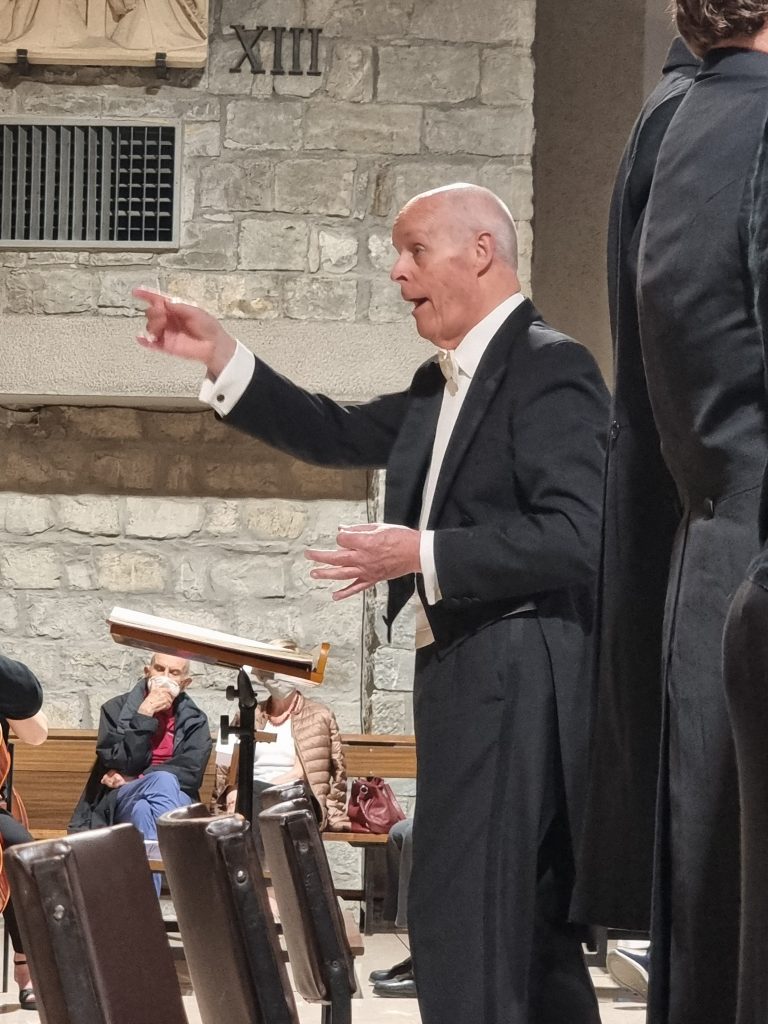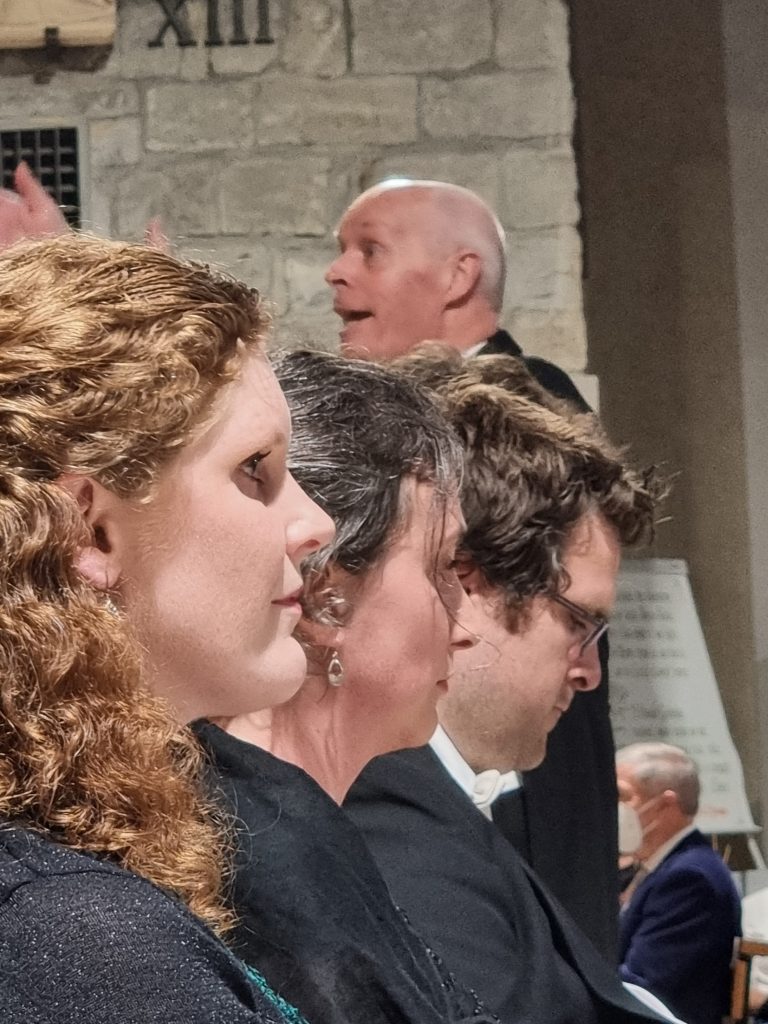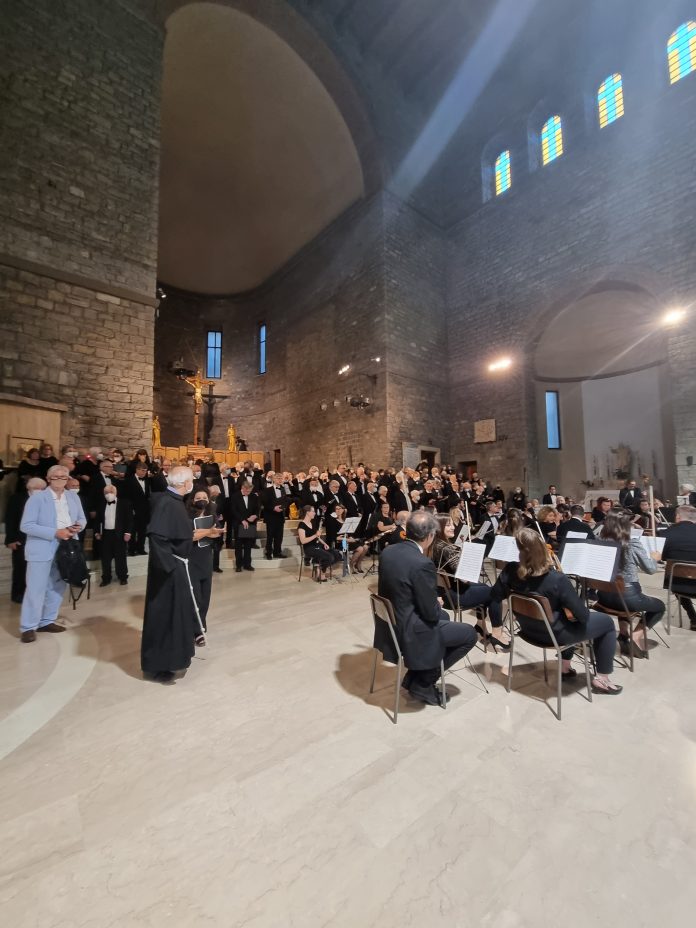Words and photography: Ashley Caneva
This past weekend, a performance was held in Trieste that was 2 years in the making. Alessandra Ressa, an In Trieste writer, had a dream to bring The Really Big Chorus (TRBC) to our city.
After lots of hard work and several changes with covid regulations, venues, etc., the big night finally arrived – and it was worth the wait. I was in attendance on Saturday and I can personally say that the performance was wonderful! Not only was the music stunningly beautiful, it was also very moving to see such a wide array of people from different musical backgrounds singing together.
The day before the performance, I had the opportunity to chat with Brain Kay, the director. If his name sounds familiar, there’s a good reason why. Kay was one of the founding members of the King’s Singers in 1968. Featured as the 6-man acapella group’s lowest voice, he went on to tour internationally and perform in 2,000 concerts over the span of 25 years.

When asked to explain for us what the Really Big Chorus is, Kay replied, “The Really Big Chorus was founded forty-something years ago, by a lovely Canadian gentleman who was a lecturer at the Imperial College in London, Don Monroe – no longer with us, sadly – and he had this … what he called “completely crazy idea” of putting on Handel’s “Messiah” in the Royal Albert Hall where anybody could just come along and sing without any rehearsal. Just sing it. And he went nextdoor from the Imperial College to the Royal College of Music, just by the Albert Hall, and he spoke to the director, David Wilcox, a great name in choral music of course, worldwide – also sadly no longer with us – and he just thought I’ll ask him if he would like to conduct this “Messiah.” … David Wilcox said, “I’d love to.” And he did it and it started the whole thing – and it built and built and built … and when I took over from David Wilcox fifteen or so years ago, we had 4,000 singing “Messiah” from scratch – which means they just turn up. They don’t have any rehearsals. I rehearse a professional orchestra, we audition young soloists, and we have 4,000 just turning up and singing. I can not tell you how wonderful it sounds. … It’s an incredible sight and an unbelievable sound. Beyond that we do three Albert Hall concerts a year, we come to places like Trieste – where we are today. We’ve been to China. We’ve been to America. We’ve been to Russia. We’ve been all over Europe… and we do a summer school every year. So it’s a busy little organization.”
If you’re thinking that directing a group of 4,000 amateur singers sounds like a challenge, you’re not wrong. Kay explained, “When we meet together like this, in a sense, the choir that met together today to rehearse, it’s the first time these people have ever sung together – and we have to do a concert tomorrow. It’s a wonderful challenge. … They all do a great job and I get immense pleasure and satisfaction from it. Better than working, any day.”

I would have to agree! As a vocalist myself, the idea of joining such a large chorus and singing in a venue like London’s Royal Albert Hall is exciting albeit dizzying, but the thought of leading such a group is even more so. I asked Kay how his experience with the King’s Singers has influenced his work with the Really Big Chorus.
“One thing you learn in a group like the King’s Singers is how to operate tightly as a group, and I think 4,000 people can operate just as tightly as six. It’s a challenge. It’s always a challenge. It’s a wonderful challenge, and when it works it’s terrific. I follow the same rules, basically. I want to blend the voices, and I want to get a sense of rhythm and attack and drive in the music – and then beyond that we are at the mercy of the composer.“
Speaking of composers, I inquired what composer and what piece Kay would most like to do if he had his choice. To which he replied, “It would probably have to be the greatest composer who ever lived, who was Bach. I know that’s only my opinion, but I happen to be right. It would have to be Bach, either the St. Matthew Passion or the St. John Passion … the “Messiah” is right up there with them. It’s just always a thrill. And you can do Messiah with any number of people. You can do it with one to a part or you can do it with 4,000. Some people do even bigger ones in different parts of the world – but it is wonderful. But I mean the world is full of glorious music. It’s almost impossible to choose… but if I had to choose, probably the St. John Passion. Shorter. More dramatic. Best music ever written.” For this performance, however, the chorus would be performing Mozart’s Requiem K262. Kay reflected, “Well what is so wonderful about doing the Mozart Requiem here in Trieste is the great tradition whereby it’s done time and time and time again. It’s sort of Triest’s “Messiah,” really.”
As with any interview, I just had to ask the maestro for his impressions of Trieste on this, his first time visiting. “Oh, I’m loving it! The weather is gorgeous, of course. To be able to walk around these pedestrian streets and sit and have lunch and coffee and so on out in the street and see people … one of the things about it is there’s very few people with ripped jeans, looking scruffy. The Italians are very elegant and beautifully dressed. My wife and I are just loving it. It’s a lovely place to come to.”
Kay arrived in Trieste with a sampling of about 125 singers from TRBC for this special performance. In reference to the philharmonic orchestra Città di Monfalcone and Trieste’s San Francesco church, he commented, “I’m lucky to work with this great orchestra here which I rehearsed yesterday, and I think we are going to have a great time. And what a wonderful venue – this huge lofty church with a great reverberation sound. You know we only sing in the nicest places. Lucky us.”
Even a brief chat with Brian Kay will convey the incredible passion and joy he derives from music, and he feels very fortunate to be able to make music his career. In his own words, “I was infected by the music bug when I was very young. I try to infect as many people as I can. How lucky is that? Where would we be without music? It doesn’t bear thinking about.”
Alessandra offered the following comments as well, “I can only say that it was a lot of work, two years of uncertainties and rescheduling but I’m very happy it finally happened and I can only be forever grateful to the Really Big Chorus for not giving up on Trieste. I was thrilled to finally meet maestro Brian Kay, and even more thrilled to see so many Triestini in the audience. I can only hope this can be done again in the future.”
This July, Alessandra will be off to London to join the Really Big Chorus in Westminster. Bon voyage, Alessandra, and thank you for bringing the Really Big Chorus to Trieste!





























